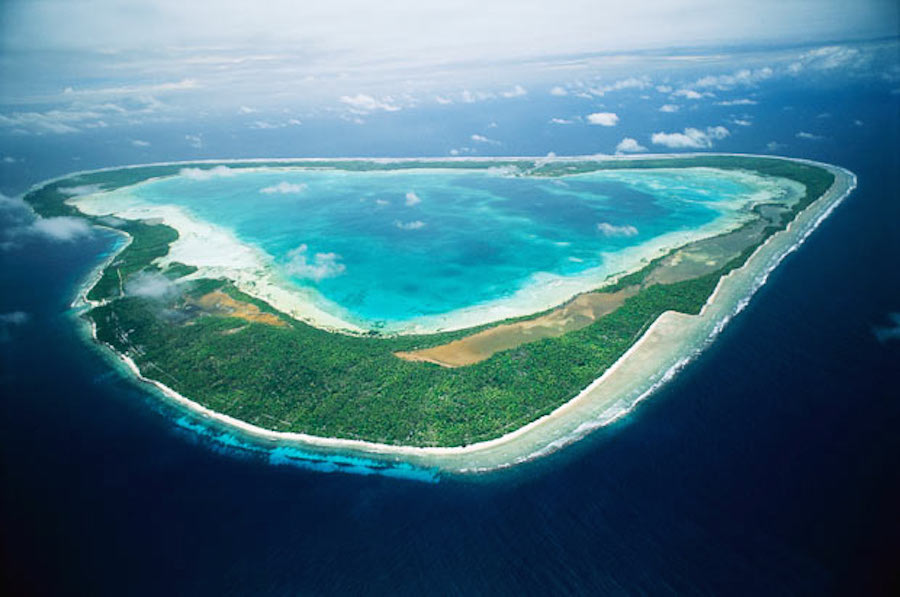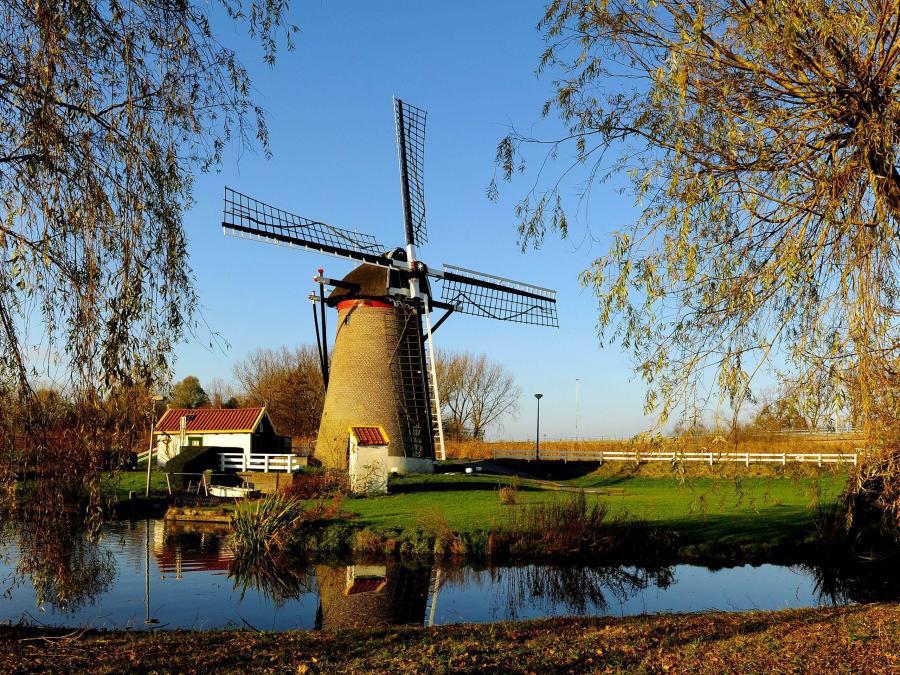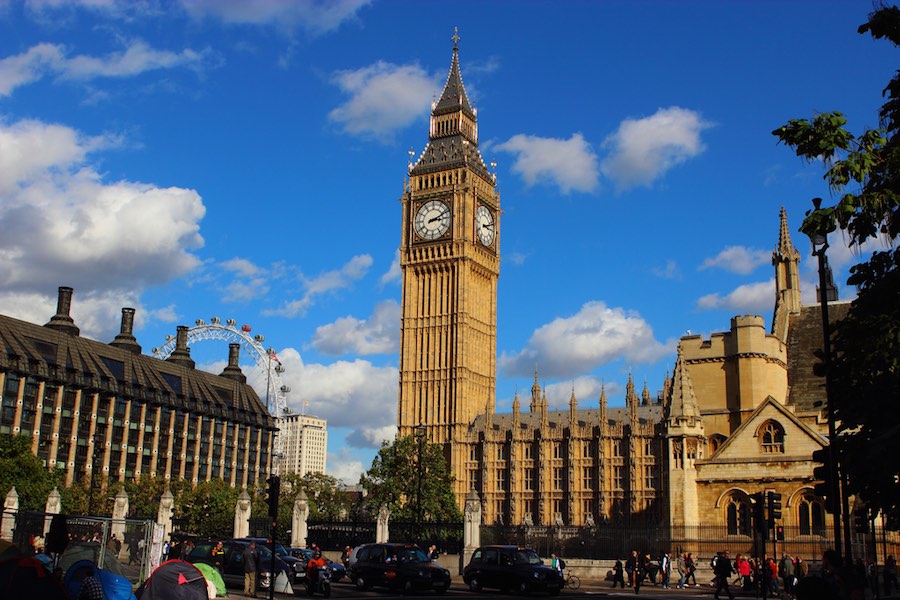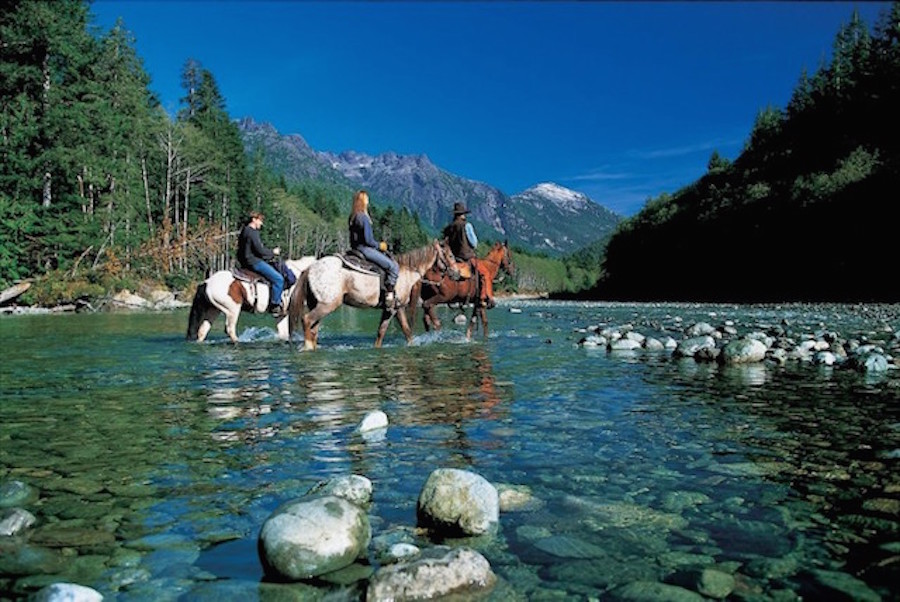It can often seem as though nations are permanent fixtures on the landscape, immovable, unchangeable, and enduring. If history has taught us one thing, it’s that nations are perfectly capable of disappearing. A number of top countries disappeared in the 20th century alone, including nations such as Astro-Hungary, the Ottoman Empire, and superpower U.S.S.R. Anyone expecting the 21st century to be any kinder is liable to be surprised. Here are some well known nations that (probably) won’t exist in 2115.
10. Kiribati

Home to one of the largest protected areas in the world (the Phoenix Islands Protected Area), Kiribati is the epitome of a tropical paradise. Independent since 1979, Kiribati consists of a series of atolls and reefs with a smattering of little islands perched on top. The temperatures are a pleasant low 80s, coconut and breadfruit trees abound, and the waters are a lovely blue.
If you feel like booking a vacation in Kiribati, however, you had better make it snappy. Owing to rising sea levels, two of its islands have already been lost to the waves (Tebua Tarawa and Abanuea), and the rest are threatened. While a few of the islands are expected to remain above water in 2115, what is left won’t be able to support the agriculture needed to maintain a national population.
The situation is desperate enough for President Tong to begin evacuating the islands already (a process sped up by Cyclone Pam). Official appeals have been made to Australia, New Zealand and Fiji to accept Kiribatians as permanent refugees.
From our partners:
9. The Netherlands

It’s easy to imagine tropical nations disappearing into the Pacific. What is less easily imagined is the loss of a European Nation to climate change. Never-the-less, this is not only realistic, but in fact quite probable. Known as much for its dikes as for being the place to go for legal drugs and prostitutes, much of the Netherlands is below sea level.
Unlike Kiribati, it is not simply rising sea levels that threatens the Netherlands. An extremely modern nation with a powerful economy, the Netherlands can well afford to continue expanding its dikes upwards to keep rising seas out. The real problem is that the same dikes that can keep the sea out can keep flooding in. With half the nation at or below one meter above sea level, the Netherlands has been constantly fighting to keep its head above water.
In 1953, A massive storm slammed into the Netherlands and neighboring Belgium. Floods as deep as five-and-a-half meters deep swept the southern parts of the country. Only the careful use of a ship to plug a dike prevented the flooding of North Holland, the second most heavily populated province. With many scientists predicting that previously “safe” Europe could soon be struck with frequent “Hurricane Katrina” level storms, we’d book our Amsterdam holiday today if we were you.
8. The United Kingdom

What many people often tend to forget is that Her Majesty Queen Elizabeth II is not the Queen of England, she is the queen of the United Kingdom. As early as Roman times attempts to unite the north and south of Britain had failed (resulting in the building of a wall between Scotland and England) and later English attempts had done little better. The death of Queen Elizabeth (the first one) in 1603 however led to parliament handing Scottish king James V the crown of England as well. In 1707 the now 100 year old merger of the kingdom was formalized as “the United Kingdom of Great Britain”.
These days, however, one of the most successful empires in history is facing a real possibility of dissolution. The union of the two kingdoms began to show cracks as early as 1853, when advocates began calling for Home Rule. In 1934 Scottish nationalists formed the Scottish National Party, which has, of late, been a champion of Scottish independence (and separate membership in the European Union).
Referendums calling for the dissolution of the United Kingdom have come up in Scotland roughly every 20 years since the 1970s. The first failed on a technicality. The second was wildly popular, and finally established the home rule that had been debated for nearly 150 years, but did not actually dissolve the union. The most recent (2014) failed by a narrow margin, but only six months later the SNP swept the parliamentary elections on a wave of reaction to the narrow failure of the referendum. With 56 out of 59 seats possible and opinion polls showing growing support for another attempt, it seems likely that the United Kingdom will be no more by 2115.
7. Canada
Canada was the unhappy offspring of the Seven Years’ War. While Great Britain and France were busy making a mess out of Europe from 1754-1763 their colonies in North America were having a pleasant, and related, brawl of their own. The end result was the addition of New France’s fishing holes to the British Empire. Unlike Scotland, where the two nations acted like loving newlyweds for a while, French Canadians always approached things more like an unwelcome arranged marriage.
Though becoming British in 1763 it wasn’t until 1840 that serious attempts were made to properly un-Frenchify them. French Canada was merged with the rest of Canada, with their main population becoming the province of Quebec. The French didn’t think much of this idea, but went along with it, mostly out of fear of being invaded by the expansionists in the U.S. (Reasonable, given its history with Mexico).
In the post WWII world, the U.S. stopped seeming to be the threat it had been, and the French Canadians haven’t really felt a particular need to keep cooperating. Starting in the ‘60s a significant percentage of Quebec has been calling for sovereignty, led by the Parti Québécois. The most recent vote on the issue failed by only 1% of the vote. With almost a quarter of the Canadian population, most of the Atlantic ports, and total control of the St. Lawrence waterway, the loss of Quebec could lead the rest of Canada splitting up under pressure from regional differences and 1st Nation sovereignty movements.
6. Taiwan

Taiwan is in an interesting position. While many people are aware of the fact that China insists Taiwan is still a part of China, what they don’t tend to recall is that Taiwan says the exact same thing. The only real debate between the two is which government is the legitimate one, the pre-WWII Republic of China government seated in Taiwan or the post war People’s Republic of China in Beijing.
Regardless of the politics, the fact is that, in terms of actual operation, Taiwan is a wholly independent nation, and has acted as such ever since Chang Kai-shek led his Kuomintang government to Taiwan in 1949. Despite its own insistence it is not, it maintains diplomatic nations with many of the world’s nations, it maintains its own military (purchasing heavily from trade partner America), it has a democratically elected government that has unchallenged rule over the island. It walks like a duck, and quacks like a duck…
Still, the fact that both Taiwan and China insist that Taiwan is just part of China goes a long way to removing the island’s nationhood. Events over time have further eroded this position, such as the UN’s kicking Taiwan out and giving China the empty seat in 1971. While there are some within Taiwan calling for an official declaration of independence, the official government stance still calls for eventual reunion with mainland China, and only 24% of the population responded favorably to independence during a January poll. As such it is only a matter of time before Taiwan returns to the fold.
5. North Korea
Just like China and Taiwan, North and South Korea both insist on an eventual reunion. Unlike the first two, however, there is little doubt about how the second two will eventually work out their reintegration. China and Taiwan are both powerful in their own right, with strong economies, powerful technological potential, and stable governments. On the Korean Peninsula, on the other hand, such parity does not exist.
North Korea, the result of the U.S.S.R. insisting on having control over the northern half of Japan’s pre-WWII colony, is in the crapper. Of the 193 member states of United Nations, North Korea’s per capita GDP comes in at 180th. The government runs entirely on the principle of the cult of personality, with dictator Kim Jong-Un conducting near constant purges of the top ranks to keep things under control. The only thing that North Korea can boast of is a strong military, and the few high ranking defectors have spoken of coup attempts by the military that have been ruthlessly kept out of the media.
Most pundits consider it to only be a matter of time before North Korea implodes under a weight of suspicion and backstabbing. When that inevitable event occurs some time before 2115, South Korea will be ready to take North Korea back into a united country and start repairing the damage done by the Kim Klan, as happened when East Germany was reunited with the West in 1990.
4. Palestine

Palestine occupies a strange position on the family tree of nation-states today. While most of the top powers of the world do not recognize it as a nation, more than two thirds of the UN’s member states do. Palestine has a seat in the UN, though it does not have a vote. Its government has shockingly little real power, as it often finds itself the subject of Israel’s wrath thanks to unilateral actions on the part of radical groups inside its borders, but it has recognised borders, a standing (if small) army, and a self-contained economy.
Unfortunately, Palestine is the weakest kid in a particularly bad neighbourhood. Most of the country is occupied by Israel as a buffer against terrorist groups. Jordan, sharing the other significant border with it, is a stable nation, but has been struggling with the instability in nearby Syria and Iraq. Jordan has been careful to be polite but standoffish in order to avoid buying even more border trouble. Egypt has plenty of problems of its own, and Turkey and Iraq are both having big trouble with ethnic separatists, so they are the last nations to be jumping aboard any separatist support trains.
Given the combination of Israeli hostility and significant instability among the Arabic states close at hand, Palestine’s severe governmental weakness is likely to result in Palestine becoming a failed state. Portions that contain Israeli settlements will likely wind up fully annexed in spite of international condemnation, while what remains could well wind up falling under the control of a UN mandate, possibly regulated by Jordan. A Palestinian state is highly unlikely to exist as a national entity in 2115.
3. Sudan

South Sudan is the newest nation in the world. It is also likely to be one of the shortest lived nations in the world. It was formed in 2011 after a referendum for independence from Sudan passed with nearly 99% of the vote. That, however, was the one and only time anyone seemed able to agree about anything.
Externally, South Sudan can’t seem to nail down any agreement regarding its border and trade relationship with Sudan. When it left, it took all of Sudan’s oil fields, but Sudan retained all the infrastructure to transport the oil away from those fields. Since then oil revenues have stagnated owing to a failure to negotiate a profit sharing deal and both nations have had small proto-wars over how to split up their resources.
Internally, South Sudan hasn’t had any better luck. 9 of its 10 provinces are suffering armed conflicts as various tribal and ethnic groups fight one another, and all of them fight a government having a civil war with itself. South Sudan is, at its heart, a microcosm of all the problems an increasingly overpopulated world faces, and is unlikely to survive them for the next ten years, let alone long enough to see 2115.
2. Haiti

If ever there was a nation that had bad luck, it’s Haiti. Even before its war for independence, it was a bad luck state. Consisting mostly of slaves at its start, Haiti has always suffered from nearly every problem that’s killing the nations already listed so far. Haiti suffered from ethnic cleansing (courtesy of neighboring Dominican Republic in the ’30s), has constantly suffered from severe poverty and the accompanying armed revolts, and has been the object of affection of nearly every natural disaster and disease imaginable. Then there are the zombies.
All of these problems are now being compounded by the same climate change threatening Kiribati and the Netherlands. Hurricanes are only growing worse as the oceans warm, and Haiti is ground zero for any hurricane that doesn’t turn towards the East Coast of the U.S. Between that, rising sea levels, desert generating deforestation, and earthquakes substantial portions of Haiti are at threat of one mass destruction too many.
Seemingly doomed from the beginning, it is perfectly reasonable for Haiti itself to become a zombie-like creature, not really alive, but not really dead. Unable to recover from disasters economic and natural, Haiti may well eventually resort to turning itself over to the UN or a better behaved Dominican Republic out of a desperate hope that they may be able to keep something in that half of the island alive in 2115.
1. Sealand

Sealand is a nation that has no chance of seeing 2115, as it never really was a nation to begin with. When Germany demanded a rematch with England, the embattled nation came up with some truly strange military ideas to bring to the fight. Most of them never saw the light of day, but one that did was HM Fort Roughs. Essentially two concrete pylons sunk into the English Channel six miles offshore, the UK built a platform holding anti-aircraft guns to shoot down German bombers on the way to the Blitz.
After the war, the guns were removed and the platform abandoned. In 1967 eccentric Paddy Bates took over the platform for use in pirate radio. After an argument over a buoy led to the platform being raided by Her Majesty’s Marines and the arrest of Paddy, the British courts declared that, as the platform was three miles outside of the three mile limit, Britain had no control over the platform. Paddy immediately took advantage of this and declared the creation of the Principality of Sealand, with himself the reigning prince. After a dispute with “Prime Minister” Alexander Achenbach led to the invasion of the platform by hired mercenaries, heir (and current reigning prince) Michael Bates led a commando raid (consisting of himself, a family friend, and a rented helicopter) to reclaim Sealand. Achenbach and his mercenaries (all German citizens) were captured, and only released after Germany sent an ambassador to negotiate their release.
Owing to the British court decision and the German ambassadorial mission, the Bates family has continued to maintain Sealand as an independent “micro-nation.” However, without some serious intervention by both politicians and engineers, Sealand won’t see 2115. In 1987 the United Nations Convention on the Law of the Sea extended all national sea borders from 3 miles out to 12 miles out, resulting in Sealand now falling inside of British waters. At the same time, it specifically ruled that artificial islands and structures cannot be recognised as establishing a territorial claim. Though Britain has yet to act on this, that rule means that the U.K. can reclaim the platform at any time, and the rest of the world will simply shrug. It may, however, be a moot point. Recent research has shown that the global conditions created by climate change will be far more destructive to concrete and iron. As such, it is likely the already somewhat rotten structure may quickly become untenable. It is likely that long before 2115, Sealand will become sea floor.
This feature originally appeared in TopTenz.



















